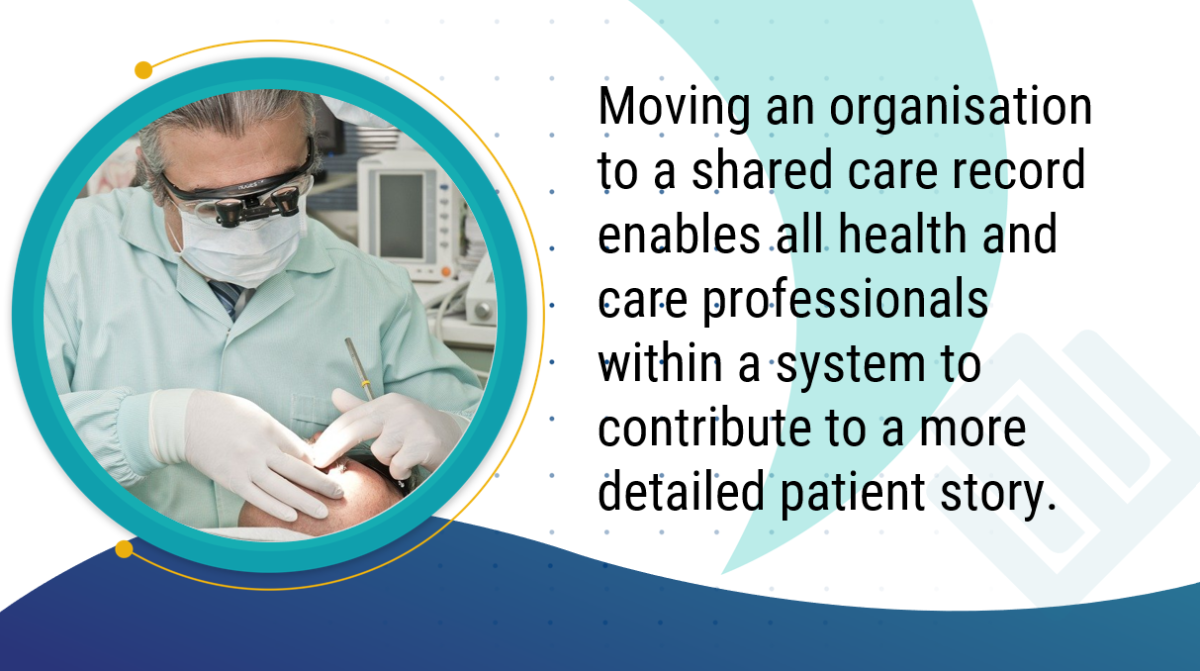One of our key goals in working with integrated care systems (ICSs) is to highlight that digital underpins all modern transformation projects.
Rather than digital transformation, ICSs should see this change as simply ‘transformation’, with digital and data being the essential tools and lifeblood that can be used to overhaul capabilities and tell the whole story about a patient. This approach allows systems to fulfil their overall goals of creating better care and, as a result, better lives for their citizens.
Better patient stories, better lives
Moving an organisation to a shared care record, to which all health and care professionals within a system contribute, is a fundamental component of each ICS. If you’re a hospital doctor and you’re providing information about that patient into the shared care record before they’re discharged, this can immediately inform their social care provision. As a primary care dentist seeing a patient twice a year, you can note early changes in the mouth that could prompt investigations for diabetes, osteoporosis or cancer.

By simplifying these tasks as much as possible, and safely sharing this data amongst care organisations, we can help carers tell better stories about the individuals for which they care, enabling other parts of the system to view the journeys those patients have been on. We can help tell those stories at a very individual and personal level.
This also means that the frail, elderly patient living with a raft of co-morbidities like chronic obstructive pulmonary disease (COPD) does not have to keep repeating their story to the five different health and care professionals across primary, acute and social care settings that care for them.
Sadly, in too many cases today, that patient must re-tell their story far too many times. That isn’t good for them or the professionals who manage their care. For some, that story is too hard to remember, too complex to repeat accurately or too full of medical language to correctly repeat. For people with mental health challenges, individuals who are non-verbal and many other groups, there is no ability to tell a story at all.
Effective digitally-enabled transformation across an integrated system can help organisations within an ICS to better understand their population as a whole and ensure the complete story can be kept up to date and shared appropriately.
Access to the totality of those patient stories through an accessible shared care record means system leaders can identify specific groups within their population to design services that meet their needs most effectively.
As each ICS works towards the requirements to have the right data and digital foundations in place in line with NHS England’s system design framework, shared care records will serve as a key tool to underpin much of this transformation.
Thinking as a system
For health and care systems to achieve what we believe that they can achieve, ICSs must enable staff to continue to plan for the future and do things differently. Yet digital leaders looking to support their ICS colleagues to deliver improvements in care face some key challenges.
Chief among these is the need to get consensus among such a wide range of colleagues across the workforce, each with their own priorities, responsibilities and agendas.
Helping these disparate stakeholders to think as a whole system means helping them to accept that the things an individual clinician or carer does may not have an immediate benefit to them, but it will have a direct impact on the stories of the people they care for and the other health and care professionals within the system.
Helping ICS leaders understand and learn from those stories by making the best use of an information-rich environment can help make this integrated, system-wide working a reality.
Once this happens, perhaps we can wave goodbye to the phrase ‘digital transformation’ and welcome transformation that considers digital as an integral component of change.
